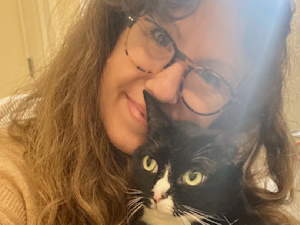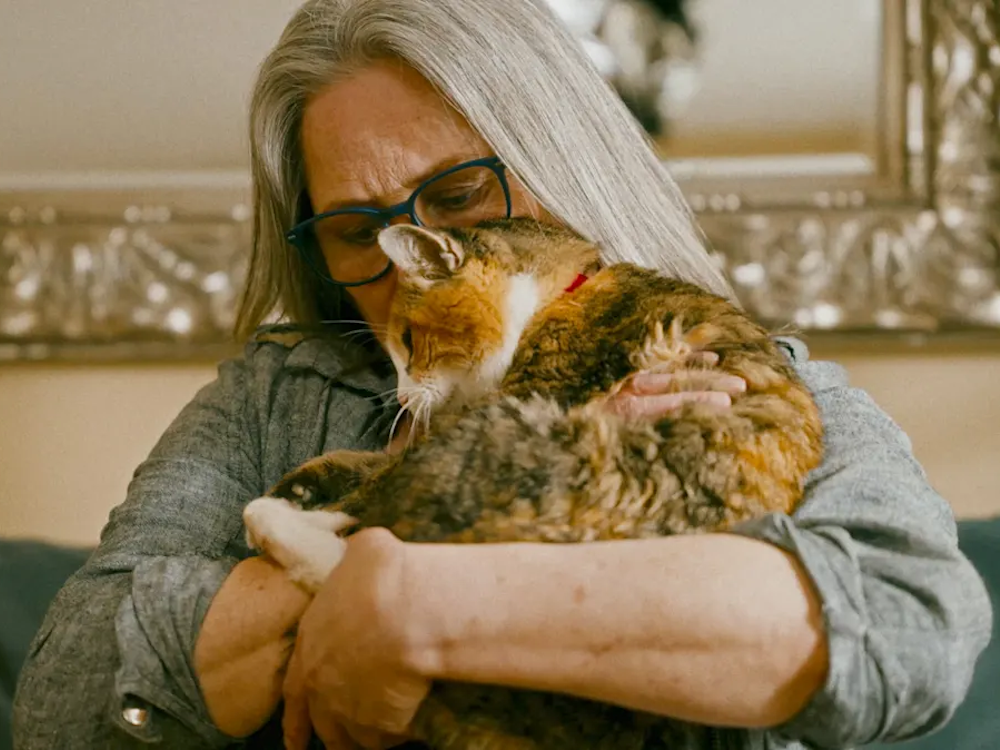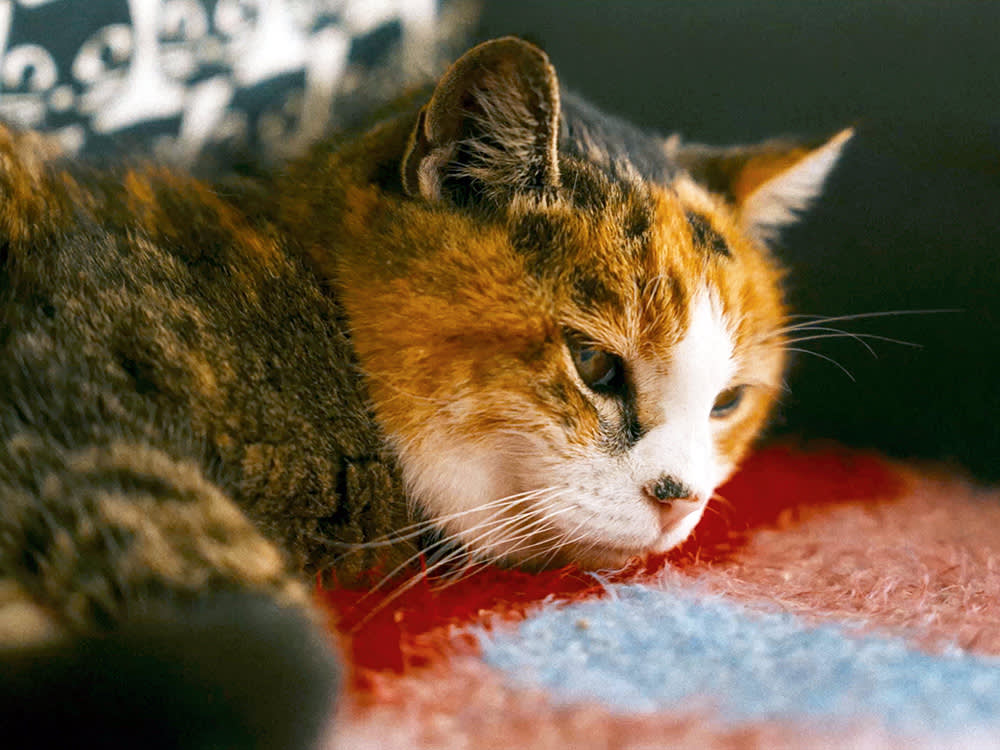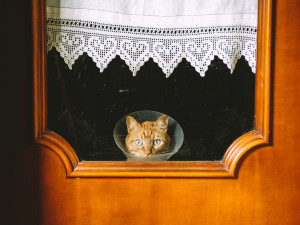Miss Muffy the Cat Is 26 and Fabulous—Find Out Her Secrets for a Longer Life
In human years, that’s more than 100.

Share Article
We probably all wish our pets could live forever, but the fact is, most of us will outlive our best pals. Research shows that the average lifespan of a catopens in new tab is in the neighborhood of 13 to 17 years — but some cats live much longer than that. Could yours? It’s worth taking notes from Miss Muffyopens in new tab, a tortoiseshell cat who just turned 26opens in new tab and is still going strong.
Miss Muffy still has all her teeth, a hearty appetite, a shiny coat, and remains active, says Diane Oickle, who adopted her in 1999. “Even as a kitten, she was full of energy, jumping on the older cats and riding on their backs,” Oickle tells me.
The last kitten born in her litter, Miss Muffy was small enough to fit in a shirt pocket when Oickle took her in; even though she already had several cats at home, she couldn’t resist — and over the years, Miss Muffy proved to be a sweet and snuggly companion. “She used to sleep curled up in my armpit, and now often rests on my left shoulder, where there’s literally a groove from years of cuddling,” Oickle, who documents her cats’ shenanigans on her YouTube channelopens in new tab, says.
Is Miss Muffy a special case, or can any cat live into their 20s? And just how old is a 25-year-old cat (she was 25 at the time of this interview), in human years? I posed those questions to Dr. Anna Fosteropens in new tab, a veterinary advisor for Whiskeropens in new tab. “Miss Muffy is the perfect example of how a cat’s lifestyle can support longevity,” she tells me. “She’s clearly been in a loving home that prioritizes her comfort, routine, and wellness. That kind of stability matters more than people realize, because cats thrive on predictability. Miss Muffy seems like she’s been treated like the queen she is for all 25 of those years!”

As to the question of cat years vs. human years, Dr. Foster says the math isn’t as simple for cats as it is for dogs. (You’re likely familiar with the familiar one-to-seven rule for them — though it may not be exactly accurate.) “The first year of a cat’s life is roughly equal to a 15-year-old human,” Dr. Foster says. “By year two, they’re closer to 24 in human years. After that, you can add about four human years for every additional cat year. So a 10-year-old cat is about 56 in human years. A 25-year-old cat like Miss Muffy? That’s about 116!”
On a quest to discover the secret to cat longevity, I asked Dr. Foster, along with other experts, to share their top tips for helping our cats live as long as possible. Here’s what they had to say.
Adopt a shelter cat.
Not only are these mixed-breed cats in need of loving homes, they’re likely to live longer. “Purebred cats tend to have more health problems due to their selective breeding,” Dr. Julie Huntopens in new tab, a veterinary consultant for Embrace Pet Insuranceopens in new tab says. “For example, Maine Coon cats frequently develop a heart condition called hypertrophic cardiomyopathy, and brachycephalic (smushy-faced) cats like the Persian and Himalayan often have respiratory, eye, and dental problems associated with their shortened noses.”
Cover your bases.
If you adopt a cat from a reputable rescue or breeder, chances are they’ve been spayed or neutered, had their initial vaccines, and been screened and treated for any parasites. But it’s important to make sure! “The classics still matter,” veterinarian Dr. Ezra J. Ameis,opens in new tab founder of Paw Priorityopens in new tab, “Spaying and neutering reduces the risk of certain cancers and unwanted behaviors. And especially for indoor/outdoor cats, vaccines are essential to protect against serious infectious diseases.”
Take them for an annual checkup.
“Cats hide disease like it’s their job,” Dr. Ameis says. “It’s our job to catch it before it becomes a big problem.” He recommends annual checkups starting at birth, and more often as cats get older. “I can’t tell you how often we catch issues like urinary disease, thyroid problems, kidney or liver dysfunction, or early diabetes just through routine screening.”
Don’t skip the bloodwork.
Dr. Hunt says that in addition to a yearly checkup, you should ask your veterinarian to run annual wellness bloodwork, consisting of a complete blood count (CBC) and chemistry profile. If your cat is more than seven years old, she also recommends adding a thyroid test.
Watch their weight.
This isn’t about fat-shaming your cat; it’s about their health. Dr. Ameis says that keeping your cat close to their ideal weight “might be the single most important thing” when it comes to longevity. “A recent study found that for every quarter pound (100 grams) a cat is over their ideal weight, their lifespan is reduced by approximately 2.5 months.”
Skip the fancy diets.
When it comes to feeding your cat, simpler is better, Dr. Hunt says. “Avoid boutique, raw, or grain free diets; these have been linked with the development of infections including Salmonella, and heart problems, including cardiomyopathy, which can be fatal.”
Don’t feed them from your plate.
Not only are certain human foods (like garlic, onions, and raisins) toxic to cats, Dr. Hunt warns, many of the foods we enjoy aren’t healthy for cats. “For example, even a very small square of cheese contains far too many calories and a high fat content,” she says. Sorry, cheese-loving cats!
Monitor their litter box.
Is your cat spending more time than usual in the litter box, or peeing outside the box? A vet visit may be in order. “Cats are masters of hiding illness, so changes in litter box behavior are often the first clue something’s off,” Dr. Foster says, adding that male cats in particular are susceptible to urinary issues.
Brush their teeth.
We know — it’s not easy. Most cats don’t like having their teeth brushed! But Dr. Foster says it’s important to at least try. “Dental disease is a major quality-of-life issue in older cats,” she says. You can always try one of these cat toothpastes and see if your cat will tolerate toothbrushing a little better.
Keep them inside.
“Outdoor and indoor-outdoor cats are at risk of trauma,” Dr. Hunt says, citing dangers like being hit by a car, attacked by a predator, catching an infectious disease, and getting lost. Want to give your indoor cat a taste of the outdoors? “Consider adding a ‘catio’ (cat patio) to allow your indoor-only cat to safely experience the outdoors,” she suggests.
Play with them.
Keep that basket of toy mice and crinkly balls close at hand: Dr. Foster says it’s important to play with your cat every day. “Movement keeps their joints healthy, and enrichment keeps their brains sharp.”
Keep their brains engaged.
Sure, your cat’s brain may be small — but they still need to use it! Laser pointers, feather wands, treat puzzles. “Bored cats get stressed. Stressed cats get sick,” Dr. Ezra says. He recommends using laser pointers, feather wands, and treat puzzles to keep their minds sharp.
Beware of the laundry room.
It might sound like something out of a Tom and Jerry cartoon, but Dr. Hunt says it’s no joke: “Keep your cat out of the laundry room, and put a sign on the washer and dryer to ‘check for cats’ before running either, as cats can become trapped in the washer or dryer (or laundry heap) when exploring.”
Watch out for plants.
“If you keep houseplants, check that they are non-toxic to cats, or get rid of them,” Dr. Hunt says. And if someone gives you a bouquet, she says to make sure there aren’t any lilies in it; they’re toxic to cat kidneys.
Keep your dog at a distance.
Your cat and dog may get along just fine, but Dr. Hunt cautions pet parents not to get too comfortable. “It’s extremely sad, but not entirely uncommon, for one or more dogs in the home to attack a housecat while the owner is away. This can occur even when they’ve lived together safely for a period of time.” If your dog has a strong prey drive, has ever acted aggressively toward your cat, or chases them, she recommends crating the dog or otherwise keeping your pets apart when you’re not home.
Keep the kids at bay, too.
Dogs aren’t the only members of your family who pose a threat to your cat. “If you have very young children in your home, monitor their interaction with the cat as well,” Dr. Hunt says. “I have seen cats dropped down stairs or shut in a door by a young child. Sometimes this trauma can be severe, or even fatal.”
Invest in a good cat-sitter.
Dr. Hunt stresses the importance of hiring a reliable pet-sitter when you’re away. “Make sure they know what the cat’s normal behavior is, so that they can recognize what’s abnormal, and leave a noteopens in new tab that includes your veterinarian’s info, along with the location and phone numbers for emergency clinics in your area.”
If you won’t be reachable during any part of your trip, Dr. Hunt says to designate an emergency contact who you trust to make healthcare decisions for your cat in your absence.
Know your cat.
The truth is, no veterinarian understands your cat better than you do. Pay attention to your cat’s behavior, and if something seems off, get it checked out. “The more in tune you are, the more likely you’ll catch subtle changes before they become big problems,” Dr. Ameis says.
Of course, following these guidelines doesn’t guarantee that your cat will live as long as Miss Muffy, but it will help your cat stay healthy for as long as possible. “A long life doesn’t happen by accident; it’s built one habit, one meal, one vet visit at a time,” Dr. Ameis says. “It’s daily, boring, unsexy stuff that adds up. There’s no magic formula, just small, consistent choices that stack up to buy your cat the one thing we all want more of: time.” (Oh, and happy birthday, Miss Muffy!)

Elizabeth Laura Nelson
Elizabeth Laura Nelson is a writer and editor based in Brooklyn, New York, whose work has appeared in The New York Times, Jenny, Best Life, YourTango, Elite Daily, and more. She focuses her work on relationships, health and wellness, midlife, and lifestyle. As a child, Elizabeth was scared of cats (claws and teeth, yikes) but she has since gotten over her fear and now shares her home with three sweet and gentle feline companions who make life better (and cuddlier) every day.
Related articles
![Happy stylish latino queer person looking comfortable on porch steps with gray cat.]()
Cats Lifespan: How Long Do Cats Live? And What to Expect
They are the absolute light of your life. Here’s how you can help them live as close to forever as possible.
![Dark-haired woman holding her ragdoll cat]()
7 “Purebred” Cat Breeds Likely to Suffer from Genetic Disorders
Especially while shelters are overcrowded, consider adopting a cat.
![cat with cone after vet visit]()
How Often Should You Take Your Cat to the Vet?
Get thy cat to a vet, even if it’s a struggle to get them out the door.
![Kitten sitting on a blanket]()
7 Steps to Keep Your New Kitten Happy and Healthy
With great cuteness comes great responsibility. A vet breaks down everything you need to know when you bring home a new kitten.
![Owner pets senior ginger cat.]()
6 Common Health Concerns in Senior Cats
How to spot and how to treat them.






